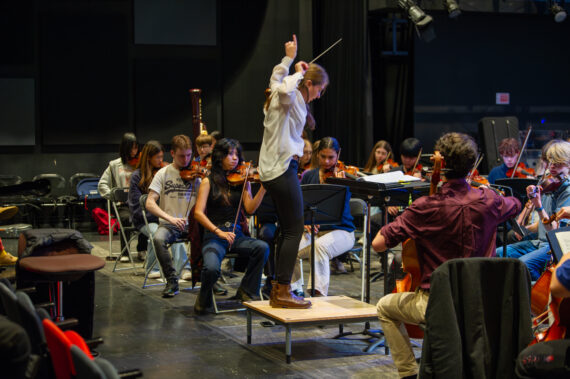Celebrating female composers on International Women’s Day

On Friday we celebrate International Women’s Day and its theme for 2024, Invest in women: Accelerate progress. Classical music has
traditionally been dominated by men and we’re committed to addressing this imbalance. Our year 13 student reporter, Macy Jagger, has written the below blog highlighting some of the female composers she loves most and has recommended a Spotify playlist of female classical composers for those exploring the genre, perhaps for the first time.
“Friday 8 March is International Women’s Day. It’s a day to celebrate women in every corner of our lives, and as musicians, honour all female composers whose music is too often hidden in the shadows.
“Looking back at history, there has always been a record of women composing music, from as early as the 1100s all the way to the current day. A woman who paved the way for female composers was Hildegard von Bingen. She was one of the earliest female composers to leave a legacy of music that is still being performed today.
“Hildegard composed many liturgical songs that ranged from antiphons, plainchant and hymns to responses. Her music is its own sound-world within itself, exposing the pure sounds of the voice, and when the music is mixed with the grand acoustics of a religious setting, leaves the audience with very little to be desired.
“A strong theme that often runs through the music of female composers are the emotions that were reflective of the time they were writing in, which concluded in some truly evocative and relatable pieces of work. For French composer Lili Boulanger, this was certainly true. Boulanger wrote for a mixture of voices, strings and piano and by the end of her life, had written 64 works, 24 of which were published. Much of her work reflects the isolation and alienation that was starting to emerge during the 20th century, along with her struggles with loneliness and depression.
“One of my favourite works of Boulanger’s is one of her three Psalm settings, Psalm 130, written for voice and orchestra. Lili had composed this work when she was nearer to the end of her life, at only the age of 22. Many say that it displays a special and developed compositional style, with a rounded sense of maturity, very fitting for the theme of IWD 2024 – ‘Invest in Women: Accelerate Progress’.
“At the time of writing this, there is some beautiful music being written by contemporary, modern-day female composers such as Judith Weir, Hannah Kendall and Judith Bingham. Dame Judith Bingham is a British composer serving as the Master of the King’s music and is the first woman to hold this position.
“At Chetham’s, we are conscious of the amount of music by female composers that has gone largely unheard and of the lack of female conductors – we are on a mission to change that. Over the past few years, we have celebrated music by new contemporary composers and have had the pleasure of having female guest conductors work with the Chetham’s Symphony Orchestra. For example, audiences have witnessed our Orchestra, conducted by Karen Ní Bhroin, performing Rann Do Tri by Irish Composer Anne Marie O’Farrell, and Elizabeth Gallego conducting Sizzle by Margaret Brouwer.
“Now, time to explore some pretty amazing music…”

Conductor Karen Ní Bhroin, performing Rann Do Tri by Irish Composer Anne Marie O’Farrell



